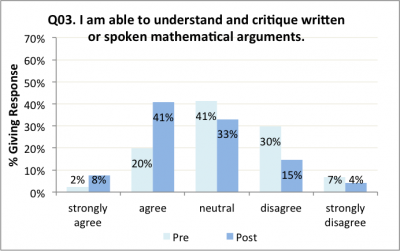Our society has an incomplete view of the nature of mathematics, one with a focus on equations, formulas, and procedures that have to be provided by an expert. How disempowering! By contrast, we experience mathematics as a creative, intriguing exploration often shared with others, building up from concrete situations at-hand to a level of abstraction that makes sense for us at that time. This project focuses on creating learning environments where each learner works actively at their edge of understanding to make sense of what's just beyond this edge. Our vision is to allow the students the recognition and conviction that this power has always been with them, and will accompany them throughout their lives, wherever they go, both within and outside of mathematics.
Goals of the project have different spheres of influence, each which are described below.
Project Goals
The overall project goals that explicitly respond to the NSF TUES Request for Proposals are as follow:
- Successfully complete the Discovering the Art of Mathematics curriculum materials, scheduled to be 11 volumes.
- Develop Teacher Resources Guides and assessment materials for each volume.
- Disseminate the series and its supporting materials nationally through robust publication.
- Provide resources for the expanded use of inquiry in general education mathematics courses.
- Implement a series of 12 professional development “traveling workshops” targeting faculty who are generally without the resources to explore and nurture the use of alternative pedagogies.
- Create and employ assessment tools that will evaluate the impact of project materials on student achievement and attitudes and may add to the knowledge base on the efficacy of inquiry-based learning in collegiate mathematics.
Student Goals
Student learning and growth is at the heart of our project. To be transformed, our students grow in many areas, discovering powerful relationships between themselves, the world, society, patterns, rigorous thinking, and communication. The specific goals for student learning are:
- Students will appreciate mathematics as a human endeavor which is one of our most fundamental intellectual pursuits.
- Students will understand that mathematics is a vital, rapidly growing field of inquiry with a dedicated cohort of practitioners.
- Students will understand the continued impact of mathematics in shaping history, culture, logic, philosophy, and knowledge, as well as its role as a humanistic and aesthetic discipline.
- Students will understand the ubiquitous role of mathematics in the world around them.
- Students will strengthen their reasoning skills and become better problem solvers.
- Students will strengthen their skills in reading, writing, argumentation and speaking.
- Students will become more self-monitoring, reflective learners and take greater personal responsibility for their learning.
- Students will approach mathematics more positively and gain a balanced perspective of mathematics.
- Students will improve their mathematical confidence.
- Students will develop awareness of the negative impact of broadly-held societal views.
- Students will be capable of and interested in considering mathematics outside of the confines of the classroom, understanding the value of life-long learning in mathematics.
PD Workshop Goals
Faculty anywhere can support their students in this growth and transformation. Yet they may also need support to grow in their own power of transforming students. Facilitating an inquiry-based learning classroom requires a very different set of teaching strategies than traditional lecture methods. We provide classroom materials, teacher materials, and pedagogical tools to support such a transition. We offer intensive traveling workshops for groups of faculty.
Our workshops will help faculty:
- experience what mathematical inquiry can feel like in a math for liberal arts class,
- investigate particular content areas that might connect with your students,
- reflect on the interaction of teacher, student, investigations, mathematics, and inquiry materials in the classroom.
For these workshops the goals and related measurable outcomes are as follows:
- Participants will experience IBL in mathematics as both students and teachers.
A workshop could include the following:
As preliminary activities participants will watch videotapes illustrating IBL in action and will observe one another's classes. At the workshop participants will observe workshop leaders modeling IBL with local students from the host institution. Afterwards participants become the students themselves and see IBL modeled from the student perspective. These experiences push participants to the edge of their knowledge as they are challenged to reflect on alternative views of teaching and learning. - Participants will learn about the resources available to support the use of IBL in their classrooms.
- Participants will develop and implement an IBL lesson in their classroom.
- Workshops will nurture the development of a community of IBL practitioners.
Assessment
Important, statistically significant changes in student affect from the beginning to the end of the semester have been seen with Discovering the Art of Mathematics students. Collected from over 1,000 students, notable changes include the following, regarding beauty in Mathematics, enjoyment and
dislike of Mathematics, and whether the student will remember this course 10-years from now.
Beauty in Mathematics
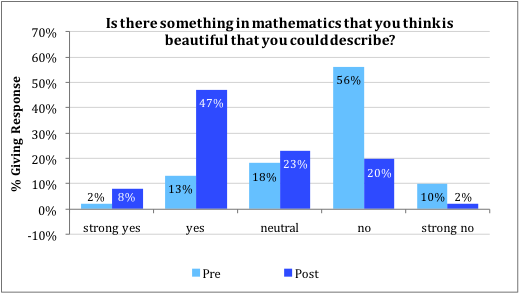
Enjoyment
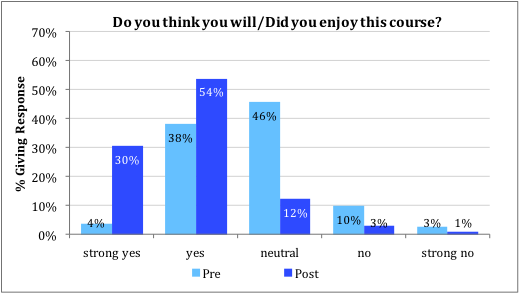
Dislike of Mathematics
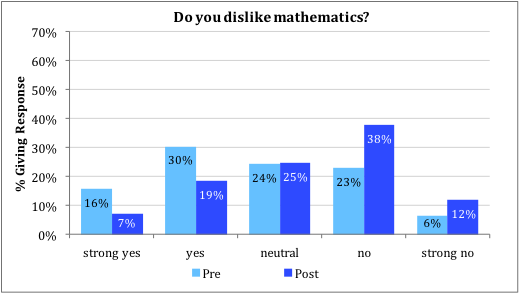
Remember 10-years from now
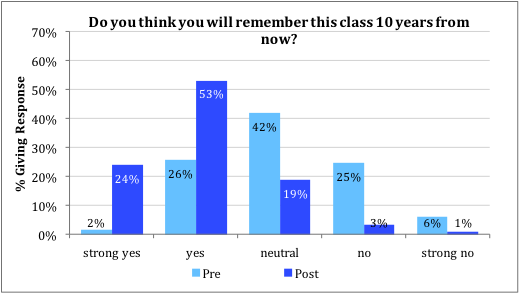
A complete description of this data is available.
Assessment tools for the Type 2 phase of this project are in development.

